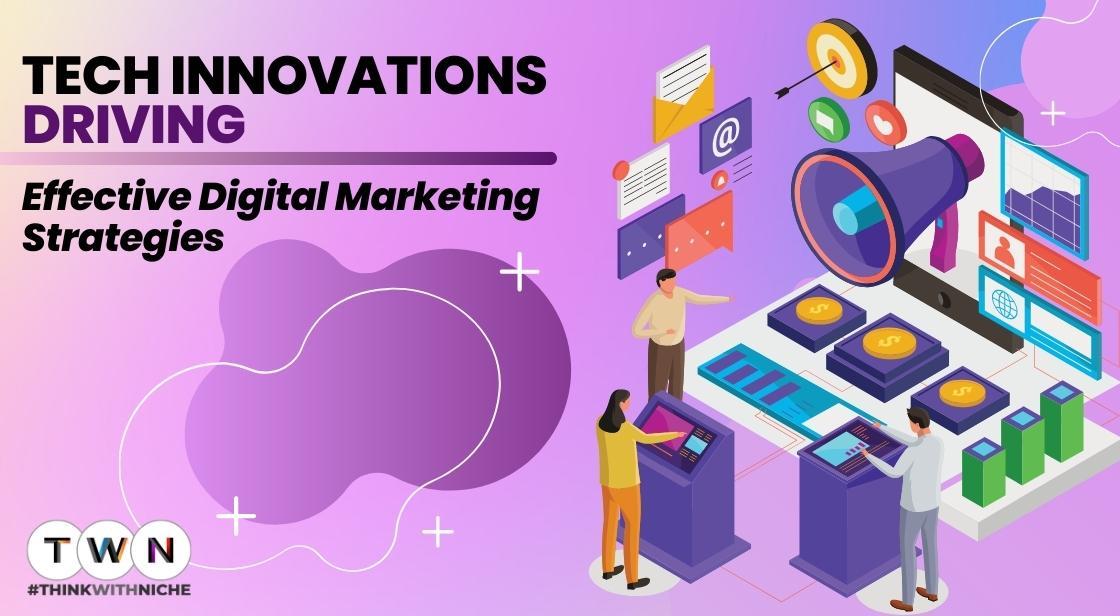Tech Innovations Driving Effective Digital Marketing Strategies

Blog Post
In the fast-paced and competitive world of digital marketing, staying ahead of the curve is crucial for businesses seeking success in the online realm.
Technological innovations have played a pivotal role in shaping effective digital marketing strategies, enabling businesses to engage with their target audiences, drive conversions, and build a strong online presence.
In this article, we will explore the key tech innovations driving effective digital marketing and their significant impact on businesses in the digital age.
Today's fast-paced and competitive business environment has made digital marketing a need for any company serious about succeeding in the internet world. With the increasing reliance on technology and the growing influence of the internet, businesses of all sizes are recognizing the importance of a strong digital presence.
In this article, we will explore the key role that technology innovations play in driving effective digital marketing strategies, and how they can significantly impact the success of businesses in the digital age.
To stay ahead in this digital landscape, businesses are constantly seeking innovative solutions and cutting-edge tools, please visit licreativetechnologies.com.
Tech Innovations Driving Effective Digital Marketing Strategies
The Role of Online Promotion in Today's Economy
Gone are the days when traditional marketing methods alone could generate significant results for businesses. With the rapid evolution of the internet and the widespread adoption of digital devices, consumers have become more tech-savvy and rely heavily on online platforms for information and purchasing decisions.
As a result, digital marketing has emerged as a powerful tool to engage with target audiences, build brand awareness, and drive conversions.
Search engine optimization (SEO), social media marketing, content marketing, email marketing, and many other tactics fall under the umbrella of digital marketing. By leveraging these channels effectively, businesses can reach a global audience, target specific demographics, and measure the success of their marketing efforts with unprecedented accuracy.
The Significance Of Incorporating Tech Innovations Into Digital Marketing Strategies
As the digital landscape continues to evolve, it is essential for businesses to stay ahead of the curve and leverage technological innovations to enhance their digital marketing strategies. Advancements in technology have revolutionized the way businesses connect with their customers, providing exciting opportunities to engage, persuade, and convert prospects into loyal customers.
Incorporating tech innovations into digital marketing strategies allows businesses to streamline their processes, automate repetitive tasks, and gain valuable insights into consumer behavior.
By harnessing the power of artificial intelligence (AI), machine learning, data analytics, and other cutting-edge technologies, companies can create personalized experiences for their target audience, tailor their marketing messages, as well as timely content delivery.
Exploring Key Tech Innovations Driving Effective Digital Marketing
The primary objective of this article is to delve into the key tech innovations that are driving effective digital marketing in today's ever-changing landscape. By understanding and leveraging these innovations, businesses can gain a competitive edge, reach their target audience more effectively, and maximize their return on investment (ROI).
Throughout this article, we will explore various tech innovations such as voice search optimization, chatbots, augmented reality (AR), virtual reality (VR), and marketing automation. We will examine how these innovations are reshaping the digital marketing landscape and discuss practical ways in which businesses can incorporate them into their marketing strategies.
Personalization And Ai-Powered Marketing
Discuss The Rise Of Artificial Intelligence (AI) In Digital Marketing
In the realm of online advertising, artificial intelligence (AI) has recently emerged as a major disruptor. With its ability to analyze vast amounts of data, learn from patterns, and make intelligent predictions,
AI has revolutionized the way businesses connect with their target audience. It enables marketers to deliver highly personalized experiences, improve customer engagement, and drive conversions like never before.
AI algorithms can process data from various sources, including social media platforms, website analytics, customer interactions, and purchase history, to gain deep insights into consumer behavior.
This data-driven approach allows marketers to understand their audience's preferences, interests, and pain points, enabling them to tailor their marketing strategies accordingly.
Explore How Ai Enables Personalized Marketing Experiences
One of the significant advantages of AI in digital marketing is its ability to deliver personalized experiences at scale. Through advanced segmentation techniques and predictive analytics, AI algorithms can create highly targeted and relevant content for individual customers, increasing the chances of capturing their attention and driving conversions.
Also Read: Top 10 Industrial Robotics Companies In The World In 2023
Voice Search And Optimization
Explain The Growing Popularity Of Voice Search
Voice searches have skyrocketed in popularity over the past few years. With the advent of smart assistants like Amazon's Alexa, Apple's Siri, Google Assistant, and Microsoft's Cortana, more and more people are turning to voice commands to search for information, make inquiries, and perform tasks on their devices.
The convenience and hands-free nature of voice search have made it a preferred method for users to interact with their devices, especially in the era of smart homes and IoT (Internet of Things).
Talk About How Voice Search Affects Digital Marketing
The widespread adoption of voice search has significant implications for digital marketing strategies. Marketers must adapt to this shift in user behavior to ensure their content remains discoverable and relevant to voice search queries.
Voice search brings about a change in the way search queries are phrased, as users tend to use more conversational language and longer search queries when using voice commands.
This shift from traditional keyword-based search queries has a profound impact on search engine optimization (SEO) and content creation.
Bring to light the significance of voice search optimization
To stay ahead in the digital marketing landscape, businesses must prioritize optimizing their content for voice search. Traditional SEO practices may not suffice in this context, as voice search introduces new factors to consider, such as natural language, conversational queries, and featured snippets.
Optimizing for voice search involves understanding the intent behind voice queries and tailoring content to provide accurate and concise answers.
Augmented Reality (AR) And Virtual Reality (VR) Experiences
Introduce AR And VR Technologies And Their Relevance To Digital Marketing
Augmented Reality (AR) and Virtual Reality (VR) technologies have rapidly gained prominence in recent years and are revolutionizing the digital marketing landscape. AR overlays digital information onto the real world, enhancing the user's perception and interaction with their surroundings. VR, on the other hand, immerses users in a simulated environment, providing an entirely virtual experience.
Both AR and VR technologies offer unique opportunities for businesses to engage with their audience in innovative and immersive ways.
Discuss How AR And VR Experiences Enhance Customer Engagement
AR and VR experiences have the power to captivate and engage customers in unprecedented ways. By providing interactive and immersive experiences, businesses can create memorable brand interactions that leave a lasting impact on their audience.
AR and VR enable customers to visualize products in their own environment, try out virtual demonstrations, and experience a sense of presence that traditional marketing methods cannot match.
These technologies also have the potential to address common pain points in the buyer's journey. For example, AR can help customers overcome the hesitation of purchasing furniture online by allowing them to virtually place and visualize the furniture in their own space.
VR can transport users to virtual showrooms or provide virtual tours, giving them a realistic sense of the product or service before making a purchase decision. By addressing these barriers, businesses can boost customer confidence and drive conversions.
Explore Successful Examples Of AR And VR Campaigns In Digital Marketing
Numerous brands have successfully leveraged AR and VR technologies to create impactful marketing campaigns. One notable example is the "IKEA Place" app, which utilizes AR to allow users to virtually place furniture in their homes.
This interactive experience helps customers visualize how IKEA products would look and fit in their space, significantly enhancing the purchase decision-making process.
Another example is the "The North Face: VR Climbing Experience," where the outdoor apparel company created a VR experience that simulated climbing a treacherous mountain. This immersive adventure showcased the brand's products while providing users with a thrilling and memorable experience, reinforcing brand engagement and loyalty.
Discuss The Potential Future Applications Of AR And VR In Digital Marketing
Looking ahead, the potential applications of AR and VR in digital marketing are vast and exciting. As the technology continues to advance, businesses can expect to see further integration of AR and VR experiences across various marketing channels.
In the e-commerce industry, AR is poised to play a pivotal role. Customers will be able to try on virtual clothing, apply virtual makeup, or test out virtual accessories, improving the online shopping experience and reducing product returns.
Virtual showrooms and try-before-you-buy experiences will become more prevalent, allowing customers to interact with products in a lifelike manner.
In the entertainment and travel industries, VR experiences will transport users to far-flung destinations, concert venues, or even fictional worlds, providing a taste of the experience before committing to a purchase. This can inspire wanderlust, generate buzz, and increase ticket sales.
Furthermore, AR and VR can revolutionize education and training, providing immersive learning experiences that are engaging and effective. For the sake of staff training, companies can now build virtual training simulations that mimic real-world situations.
Conclusion
In today's digital landscape, several key tech innovations are driving effective digital marketing strategies. These innovations include artificial intelligence (AI) for personalized marketing experiences, voice search optimization, augmented reality (AR), and virtual reality (VR) experiences.
AI enables businesses to deliver highly tailored content and recommendations, while voice search optimization ensures that businesses remain discoverable in voice search queries. AR and VR experiences captivate customers and enhance engagement, providing immersive interactions that leave a lasting impact.
You May Like
EDITOR’S CHOICE












